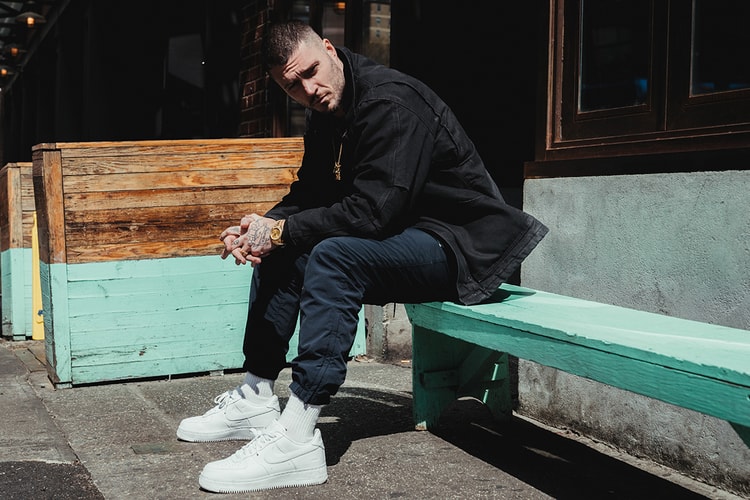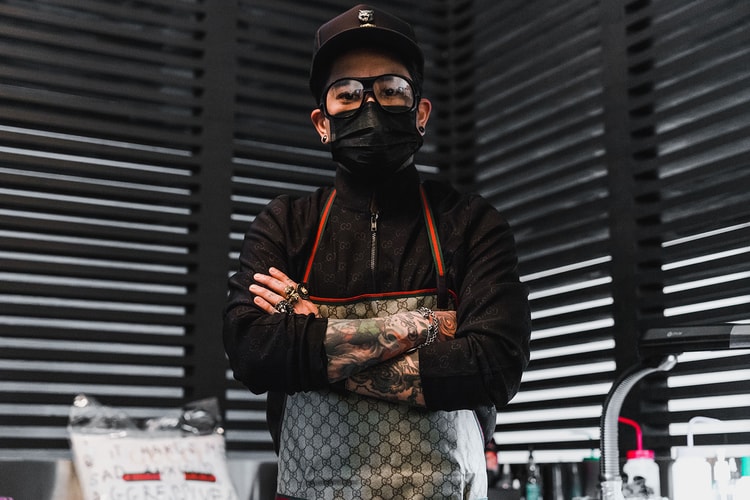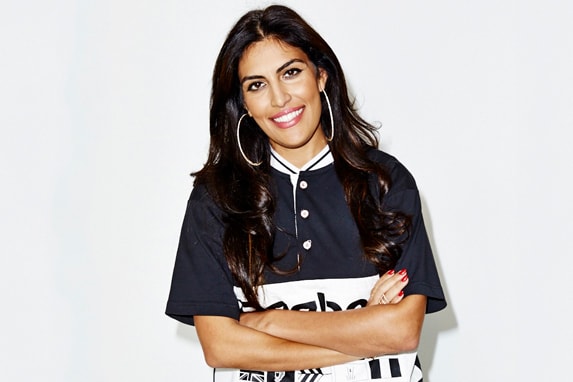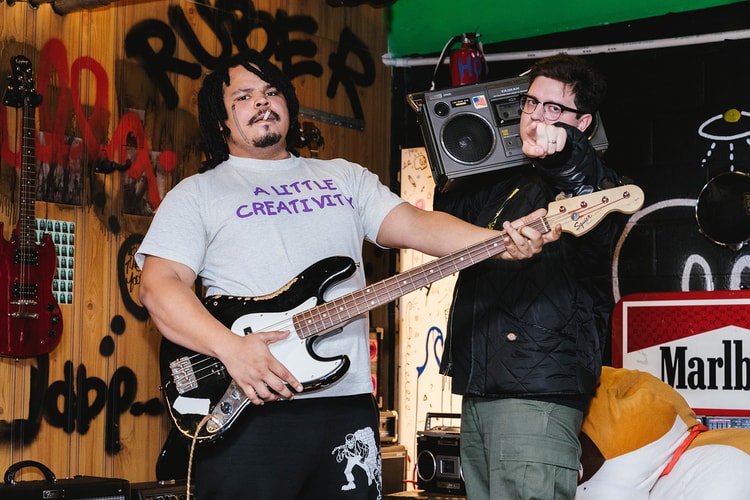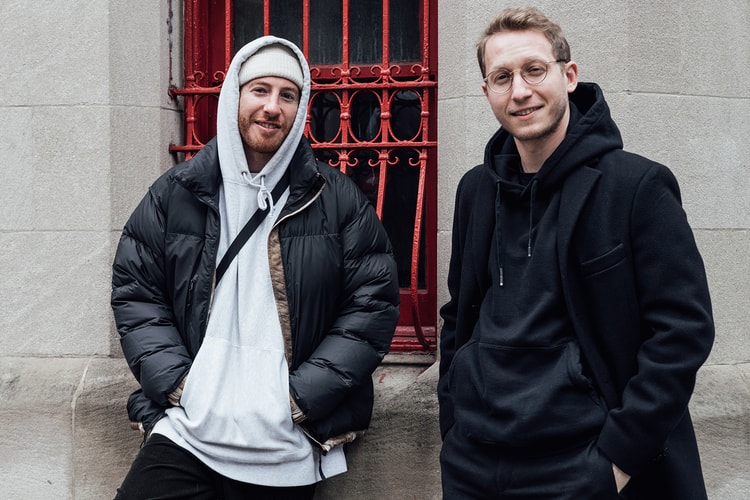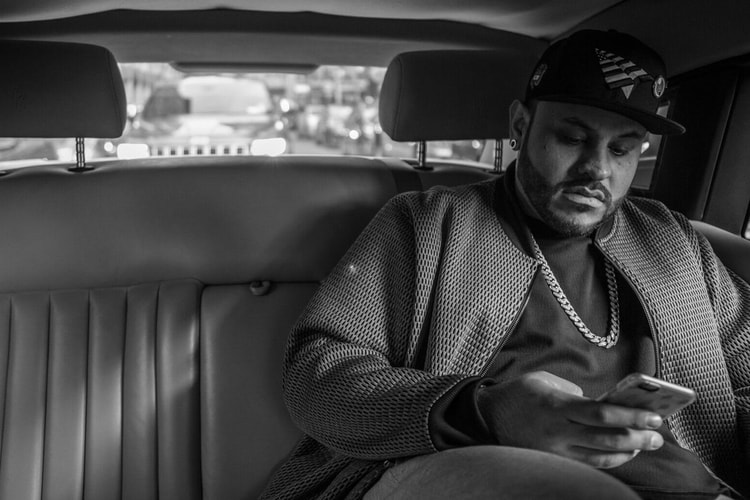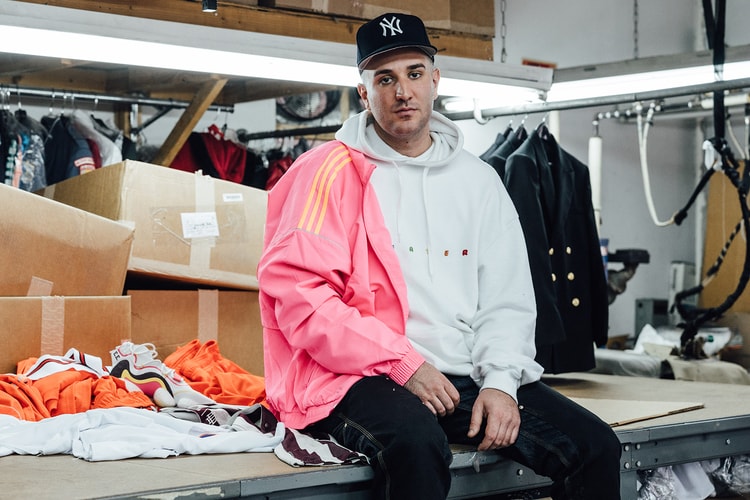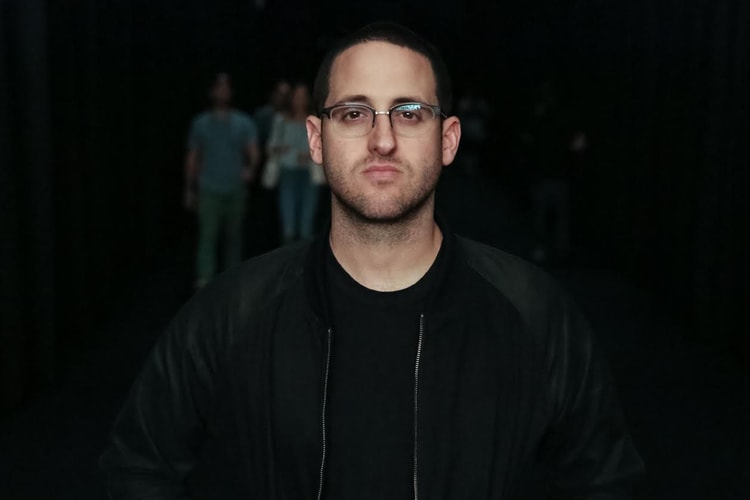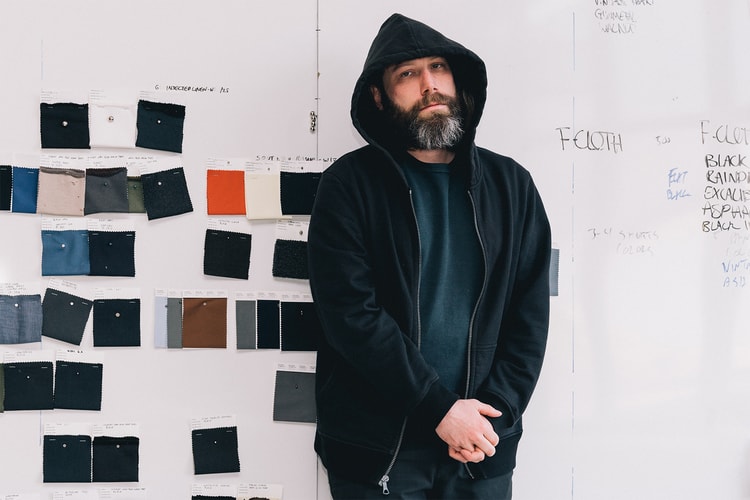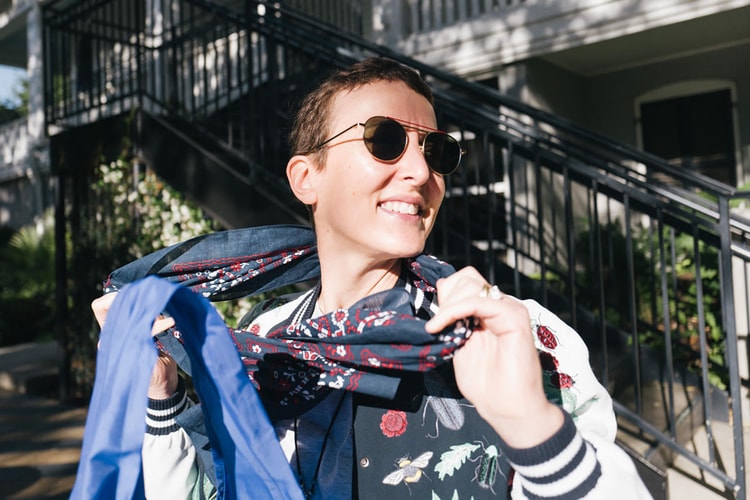Jeff Staple: Okay, cool.
Yoon Ahn: Yeah.
Jeff Staple: All right. Just to give you some background, this is a new HYPEBEAST Radio show called the Business of HYPE. It was Kevin and I sort of talking about what podcasts really need. And the idea that all of us inspire people to go out and follow their dreams, and quit their day job and do their thing. But then a lot of young people do it, and then I hear, “What do I do now?” What are some of the challenges with real logistical stuff, trademarking, legal, banking, financing, and stuff like that? That’s where I want to sort of concentrate on. Kind of getting into the real nitty-gritty business side of things, which is a side that very rarely gets exposed.
Jeff Staple: From HYPEBEAST Radio, I’m Jeff Staple. And this is the Business of HYPE, a show about creative entrepreneurs, brand builders, innovators, and the realities behind the dreams they’ve built. Yoon Ahn is a polymath, the pure definition of the word. You just can’t describe someone like her using one adjective. I first connected with Yoon and her partner, Verbal, around 10 years ago. I remember we ran into each other at the old Stussy Soho store, the one with the HEAD PORTER store above it. And we stayed connected ever since. Back then, I thought Yoon was a dope graphic designer. In the early 2000s, graphic design was in an era of crazy Photoshop filters and an explosion of new typefaces. Too many fonts, too many filters. With all these new tools at your disposal, it was hard to stay true to graphic design roots. I was one of those designers that spent way too much time adjusting the kerning in the header. And I could tell in five seconds of looking at Yoon’s work that she had the same eye for detail.
Jeff Staple: But for Yoon, as the years progressed, graphic design would morph into music packaging, accessory design, jewelry design, and then fashion design. The thing is, the process was a very slow build. Each new skill set was a careful, deliberate layering into the person that Yoon would become. To me, viewing her from afar, it didn’t feel like someone trying to do everything all at once. It felt more like a martial arts master slowly graduating from one belt to the next. The release of this episode is timely because just last week, Yoon was named Dior Homme’s jewelry designer. And coming off news that Virgil Abloh will become Louis Vuitton’s new artistic director, this is a groundbreaking moment in fashion. What this means for race, what this means for minorities, what this means for gender empowerment, and what this means for street culture as a whole. What a time to be alive.
Jeff Staple: I do want to start with just some brief background info for the people who might not know you. I think what’s really interesting about your story is that it’s like there’s a deep, wide melting pot of what makes up Yoon and Ambush. I think a lot of people see you today and don’t realize that cities like Seattle and Boston play a huge part in your upbringing, and it’s not just Tokyo and Paris. But you have this very long journey. Maybe talk about the very beginning of how Korea and America played a part in your upbringing.
Yoon Ahn: My dad was in US army. So I was born in Korea, but because whenever he gets stationed so we have to move. So I was born there but my dad … We had to move to Hawaii, we live there for a little bit. We went back to Korea, and then we went to California, went back to Korea. And then he decide to leave army, so we settled in Seattle. So I grew up in Seattle for a little bit, and then went to college in Boston. And that’s where I met Verbal, and I was working as well. And my dream was to go to New York to work as a graphic designer, because that was all the big publishing houses were. But around that time he was like, “Why don’t you just come out to Tokyo to see if you want to just kind of test out. Maybe there’s something for you to do.”
Yoon Ahn: And moving to another country wasn’t something that I had in mind. Because for me it’s just American … I grew up in the States and I went to school. So for me it was like, “Okay, next big step is making in the big city.” Kind of thing. But then I was like, “Why not? Kind of, I guess if things don’t work out, I can always come back here.” And then I’ve been stuck.
Jeff Staple: So at that point you considered yourself an American?
Yoon Ahn: I still. I’m Korean, but it’s funny, I have this conversation a lot with a lot of people who kind of grew up in different places. I don’t know why, maybe similar people attract each other or not. But I kind of see myself as an alien. I don’t really have home-home. Because I was never born and raised in one town where if I go back my friends are there, all my family is there. It’s like none of that exists. Even my parents’ families are all over the world. Even my family is all over the world.
Jeff Staple: So you’re kind of homeless?
Yoon Ahn: Yeah, I’m homeless. But that’s … When I was kid I used to hate it so much. Because I moved around so much, and I changed school so much that I couldn’t make friends. Because by the time I’m about to become friends with everybody in school, it’s like, “I got to go.” And I still feel really lonely, because it’s just like, “Okay, what’s next? I’m moving again.” And I did feel like I didn’t want to invest my time getting to know people.
Jeff Staple: Because you kind of knew you would leave?
Yoon Ahn: Yeah, exactly. So I actually-
Jeff Staple: That’s so sad.
Yoon Ahn: No, it’s not sad. Because in retrospect, I feel like it was all meant to be. Because all those times that I spend reading about stuff in the libraries or listening to music and everything, those are those stuff that’s feeding me right now to do creative work.
Jeff Staple: Alone, instead of partying and going sleeping over friends’ houses and stuff?
Yoon Ahn: Yeah.
Jeff Staple: Right.
Yoon Ahn: Because people are always like, “Where do you get inspirations from all the things?” Those are the stuff that all those hours I buried myself in the public library, reading all the materials that exist in the library. Listening to music, like AM radio, college stations, digging up old bands and … You know what I mean? Back then it used to be something kind of lonely. But then when I look back I’m like, “It’s kind of cool.” Yeah.
Jeff Staple: So Seattle was high school?
Yoon Ahn: Middle school, high school.
Jeff Staple: Okay. And then you graduated high school and then went to Boston-
Yoon Ahn: Boston.
Jeff Staple: … college or university?
Yoon Ahn: University.
Jeff Staple: Okay. With a major in what?
Yoon Ahn: Graphic design and minor in art history.
Jeff Staple: Okay. And in high school you already knew that you wanted to do graphic design, that was your set dream?
Yoon Ahn: I think I knew in the middle school.
Jeff Staple: Really?
Yoon Ahn: Yeah. Because I think … What was the project? We used to do these projects where we have to do presentation. I think it was my science class or something. We had to make all these props and visual … Like we were to draw things, charts, and all these things to do the presentation in front of your class. I loved it so much.
Jeff Staple: Creating the presentation?
Yoon Ahn: Creating things, doing the graphics. How can I make this, all the stuff? Another thing that I got into graphic design is all those fashion magazines I was reading in the public library, Vogue and everything. Because Seattle it wasn’t the same place back then. It was like really … The industry wasn’t really booming as is now. That was the beginning of Starbucks.
Jeff Staple: It was like a small town story.
Yoon Ahn: Exactly. It was the beginning of Amazon and all those big corporates. It was a dingy city. It was kind of … Economy, it was all right. And it’s just the weather is always gray and rainy and stuff. And I still look at those fashion magazine and think like, “Man, what is this world? I got to go to New York.”
Jeff Staple: Were you more of [crosstalk 00:08:00]-
Yoon Ahn: I don’t know why but it was all over-
Jeff Staple: Because that’s … Yeah.
Yoon Ahn: Yeah. That was it.
Jeff Staple: [crosstalk 00:08:03] that was in New York. Yeah.
Yoon Ahn: Exactly.
Jeff Staple: Were you more in love with the fashion or the graphics?
Yoon Ahn: Both. Because I was looking at those images thinking like, “Who are these beautiful people? They look so happy. And how can I work … I want to be there” And then in my young mind, I was just kind of like, I mean, I didn’t think designing fashion or jewelry was something that I wanted to do. It’s just that the picking up of the magazine and reading it, I would just like, “Hey, I want to do something like this.”
Jeff Staple: Yeah. Were you already dressing in middle school and high school different than other people?
Yoon Ahn: Yeah.
Jeff Staple: Really?
Yoon Ahn: Yeah. I was like … Yeah. And I don’t think I ever blended in.
Jeff Staple: Really?
Yoon Ahn: Yeah.
Jeff Staple: Okay. And then why did you pick Boston, out of curiosity? Why not FIT or something like that?
Yoon Ahn: It’s because I did get into a few colleges and I did get accepted. And I did get into NYU too.
Jeff Staple: What was the reason for Boston?
Yoon Ahn: I knew I wasn’t going to study if I go to New York.
Jeff Staple: So you were protecting yourself from New York city?
Yoon Ahn: I wasn’t protecting, I was being real. And then besides that, BU gave me full scholarship.
Jeff Staple: Okay. That’s [crosstalk 00:09:15]-
Yoon Ahn: So I was [inaudible 00:09:16] practical reason. I’m pretty practical person.
Jeff Staple: Did your parents support your idea of being a graphic designer? They were cool with it?
Yoon Ahn: I don’t think they … I mean, in general, my mom she wanted to study art all her life. So she did go to school for it, but she couldn’t pursue it. Because her family business, my grandpa messed up the business. So they went bankrupt, they had all those issues. So she got married early, but she felt like that was her first thinking, the right thing to do as a daughter. And it just kind of … You know what I mean?
Jeff Staple: Follow the Asian path.
Yoon Ahn: Yeah, exactly. So she really installed in my head from really young, as a woman, all this stuff is great too, but make sure you do what you love.
Jeff Staple: Good.
Yoon Ahn: It’s good to have your job, have your time, and all the stuff. It was really installed in me from when I was really young. Although she did the Asian mom thing by really showing me how to cook and all those things. And making sure that I helped out on the side with all those things. But yeah, I think that side of mom tell me to be who I am.
Jeff Staple: Yeah. And dad was a military army guy.
Yoon Ahn: Yeah.
Jeff Staple: Was he-
Yoon Ahn: Very strict like-
Jeff Staple: Did he understand-
Yoon Ahn: … very on the dot.
Jeff Staple: … the art world?
Yoon Ahn: No. I didn’t know until he told me he wanted to be a journalist. He wanted it to be that media and he didn’t pursue it. I just didn’t know why but … Yeah.
Jeff Staple: So there was no reservations about graphic design?
Yoon Ahn: No.
Jeff Staple: They were sort of supportive of it.
Yoon Ahn: No, they were very open. I think it wasn’t like one of those Asian parents, like, “You have to become doctor or lawyer.” It wasn’t that. They were just like, “As long as you make a living and you’re not going to be hungry.” It’s just, “Make sure you do well.”
Jeff Staple: Right. And then Boston is when you met your soon to be husband-
Yoon Ahn: Yeah.
Jeff Staple: … Verbal. Who at the time was not a musician yet. Verbal is now a well known musician, but back then he was like …
Yoon Ahn: No, actually he was doing music when he was young and in high school. But I guess his parents didn’t want him to do music because being the typical Asian parents, they just thought that …
Jeff Staple: That’s not a real career.
Yoon Ahn: Yeah. You’re not going to make any money. Go to college, be something else. I guess he did get record contract when in high school but he didn’t get it. He didn’t-
Jeff Staple: Take it.
Yoon Ahn: … take it. So he dropped it and went to high … I mean, college. And I think one of the summer breaks he went back home and he was just helping out his friend who was making a demo tape, who just became one member of the M-Flo now.
Jeff Staple: Yeah.
Yoon Ahn: And-
Jeff Staple: That was during Boston?
Yoon Ahn: Yeah.
Jeff Staple: Okay.
Yoon Ahn: Yeah. And started [crosstalk 00:12:08]-
Jeff Staple: So he was already quite big in Japan, but while going to college.
Yoon Ahn: He was starting to get big I guess. But I didn’t really pay attention in what’s going on in Japan. Because, I mean, back then it wasn’t like … How do I say it? Like instantly you could check things out. So you have to kind of hear from other people-
Jeff Staple: Or go there. Yeah.
Yoon Ahn: Go there to really see what was going on. Yeah, I mean, it was just like I knew it was blowing up, but I didn’t know the extent of how big it was. Yeah. And I wasn’t really following Asian pop back then. I mean, I still don’t really in a way, but … Yeah.
Jeff Staple: So what were your influences in what are you listening to, what are you watching on TV? Are you full on listening to only hip hop and R&B, like American?
Yoon Ahn: No. I got into hip hop and R&B more in Boston. Because there’s so … It’s like a lot of my friends came from New York, and for them it was all about that. That’s how I got interest to more hip, that genre I think from college. Not that I wasn’t really listening to it before, but Seattle it was a different city.
Jeff Staple: Yeah. And Seattle has its own crazy music scene.
Yoon Ahn: Yeah.
Jeff Staple: So you were into-
Yoon Ahn: [crosstalk 00:13:18] and then-
Jeff Staple: … Indie rock and stuff?
Yoon Ahn: Yeah.
Jeff Staple: Okay, cool.
Yoon Ahn: And I was like an emo kid.
Jeff Staple: Okay. Nirvana and the Pearl Jam?
Yoon Ahn: Yeah. Remind me who didn’t.
Jeff Staple: Yeah, exactly.
Yoon Ahn: Like all the Sub Pop and had like [crosstalk 00:13:29]-
Jeff Staple: Yeah. So what about movies and TV and stuff you were watching all like American stuff?
Yoon Ahn: I was. But I was more into really local college programs. Like the more local scene of … They used to have these all these random programs in the middle of the night talking about Indie movies and all those things. I don’t know why, I was just always into something that was off not major. Like for me it was more interesting to dig into those things, like collecting local newspapers in college, university downtown and all these different areas. And I always reading like-
Jeff Staple: Like zines and stuff like that.
Yoon Ahn: Yeah like zines and all the sub reading about what’s going on. And I was under age so I can’t go to these places. But just I loved reading about it and checking them out on radios and TVs and all that stuff. Yeah.
Jeff Staple: Yeah. Did you finish Boston?
Yoon Ahn: Did I finish Boston?
Jeff Staple: Yeah, did you graduate?
Yoon Ahn: Yeah, of course.
Jeff Staple: Okay. So you graduate and then you’re thinking I’m going to go to New York, make it to the Big Apple finally, right. That was your sort of next step intuition?
Yoon Ahn: That’s what I thought I was going do. But I mean it’s not as easy as … Like wish is one thing by reality is another thing. So I ended up working in a graphic design firm in Boston doing very corporate stuff.
Jeff Staple: Which one?
Yoon Ahn: It was like a small design firm but we had clients, like all the local hospitals. We were doing something for Harvard Business School. So it was very like stiff graphic design kind of thing. But even that, it taught me. Because I learned how to manually create visuals for companies.
Jeff Staple: Like standards and stuff like [crosstalk 00:15:07]-
Yoon Ahn: Exactly. Because it’s quite … That’s what I learned from I think that stage when I was working there.
Jeff Staple: Right. And I think that comes through in your work now. There’s definitely a graphic designers eye on everything that you do now. And it’s like very sort of … I don’t know if the right word is clean. But it’s like you could tell that someone knew the rules of graphic design in making this.
Yoon Ahn: Yeah, I get really tedious about even the type of kerning and all that stuff. People get like, “What?” But I’m like, “No, trust me, you’re missing one point right now.”
Jeff Staple: Verbal convinces you, at the time you’re working at this graphic design studio, is that when he convinces you right around that?
Yoon Ahn: Yeah. Because I was bored. I was like, you’re young and you’re like, I wanted something creative. Like, “I want to do this and that.” And he was just like, “Well, New York is okay, but just come out to Tokyo.” Because back then Tokyo was booming with a lot of creative stuff.
Jeff Staple: Yeah. And what year is this?
Yoon Ahn: And it was like 2003, ‘4 ish. Yeah. So I was like, “I guess.”
Jeff Staple: Had you been there before?
Yoon Ahn: Once. Yeah.
Jeff Staple: And he was already getting his career off the ground at this point?
Yoon Ahn: Yeah, of course. Yeah.
Jeff Staple: Okay. So I mean, was he like, “You don’t have to worry, I’m going to take care of you.”
Yoon Ahn: I mean, he did. I mean, because I’m going to another country and not being able to speak the language, all this stuff. It’s just like-
Jeff Staple: Scary.
Yoon Ahn: It is scary. Yeah. But I mean even that, it did take me few years to learn Japanese and be where I was. But me, the fact that I’ve moved around so much when I was young, it … I don’t know.
Jeff Staple: It was you were comfortable with just pack up and go. You were used to it.
Yoon Ahn: Yeah. And I can just pick it up instantly.
Jeff Staple: Were you thinking, and maybe you and Verbal, where you guys thinking like this was a temporary stopover until a short move?
Yoon Ahn: I wasn’t thinking too deep. I just kind of like, “Let’s see.” And then I didn’t even think I was going to be doing what I was doing back then. I was just looking for something to do and-
Jeff Staple: Probably graphic design, right?
Yoon Ahn: Yeah. But even that, it’s not easy, because I couldn’t speak the language. So what can I do? It’s like just find a job that whatever I can around me. And then one of the first things I started doing was just helping out with the styling. It’s because even back then, the genre of hip hop was quite, I think, new to Japanese market.
Jeff Staple: It was like premature. It looked like early days of New York hip hop.
Yoon Ahn: Exactly. I think their understanding is just that and it was stuck. So whenever there was something going on, we would ask for clothes or whatever. They would just still bring FUBU jerseys and all that stuff. And we were like-
Jeff Staple: Extra large.
Yoon Ahn: … “Are you serious?”
Jeff Staple: Double extra large.
Yoon Ahn: Yeah. Like, “Seriously, really?” And we used to get so upset. I mean, I don’t know anything about styling, but I knew what he liked. So we were like, “Give us the budget, we’ll just go get what he want to wear. And just let that be.” Because at the end of the day, I didn’t believe that that … Maybe because I come from more listening to rock background, the artists on stage should be the same as off stage.
Jeff Staple: Okay. You shouldn’t have a costume.
Yoon Ahn: Exactly.
Jeff Staple: It’s very easy for a young creative, especially one who finds themselves in a new environment to just go with the flow. To say, “Hey, this is the way it’s been done, so let’s just go with it. I don’t want to rock the boat.” What’s really cool about Yoon is that she took her roots of Indie rock and Seattle, and here she is now sitting in an uber machismo hip hop world in Tokyo. And she’s saying, “No, we ain’t doing it the old way. We’re doing something different.” This takes a ton of courage. The courage to not forget where you came from and speak up for what you think is right.
Yoon Ahn: So for me it was just like, I knew he had the eccentric side. And he liked all these fashion brands, like Dior Homme and Raf Simons and all those things.
Jeff Staple: Why wear FUBU when you go on stage, right?
Yoon Ahn: Exactly. I mean, this is early 2000 like three, four. They didn’t get the concept of it. Because they still thought that rappers are supposed to look like something. We were like, “No, we’ll wear what he likes to wear.” And that, yeah, I think it’s funny, now high fashion is something infused so well with hip hop. But he was already doing all that stuff being himself. It was like no one was telling him, he wanted to wear those skinny Dior cut. You remember Hedi Slimane making all those skinny Dior women stuff?
Jeff Staple: Yeah.
Yoon Ahn: That’s what he was performing in. Because he felt most himself in that, not hip hop.
Jeff Staple: So you acted as a stylist essentially? Not really [crosstalk 00:19:50]-
Yoon Ahn: Well, I don’t know. That kind of gives me cringey to say I’m like stylist. But I’m like, I just helped him out. Yeah. Because he didn’t have to go get the clothes, I would just like … I knew what he liked. It was easy for me to just go get it than having to explain to someone like, “Listen, that’s what he’s looking for.” Kind of thing.
Jeff Staple: Yeah. And so how do you now … Because I remember before Ambush you had Antonio Murphy Astro, right?
Yoon Ahn: Yeah. That’s just one of those things that Verbal was just kind of … He was starting to make jewelry for fun, because … He was in. Remember everybody like Nigo and Pharrell-
Jeff Staple: Chains and everything.
Yoon Ahn: Exactly. So he was just making few jewelries for himself for stage and whatever. And we just knew a few people could actually do fine jewelry. So we asked, commissioned them. We had ideas, sketches and everything, and we just asked them to make us those pieces. And then it just got blown.
Jeff Staple: Well, do you remember the first time where it kind of became something other than Verbal and you guys making stuff just for Verbal? Was there an order, was there a request from someone that was like, “Oh wow, this is something bigger now.”
Yoon Ahn: I think that the POW! the knuckle ring that he made for fun, I think that was the genesis of it. Because he made that, that got a lot attention. Because no one was doing really pop graphic fine jewelry back then. So that caught a lot of attention and people wanted to buy. But of course, I can buy a huge piece like that. We were like, “Why don’t we make just a smaller one?” And when I’m just-
Jeff Staple: A smaller ring. Yeah.
Yoon Ahn: Or let’s that’s coat them in like neon colors. Because we’re both so into neons, I don’t know why. And then that was the genesis. And I remember just Kanye picked it up. Because he used to come more a lot for Teriyaki Boyz. And then there was a start. Well, I mean we weren’t even thinking about doing brands. We just made it, give it out to friends for fun. And then that’s when buyers were like, “We need to have it.”
Jeff Staple: Okay. After Kanye wore it?
Yoon Ahn: I mean, Verbal was already big, so people wanted it. But Kanye wearing that, we got that from overseas buyers. Like Sarah from Colette calling and I remember that. From RSVP and all these different people. We were like, “What is going on?” Yeah.
Jeff Staple: Where were you making these, in Japan?
Yoon Ahn: In Japan. Everything Japan still.
Jeff Staple: Everything Japan still. Okay. So you just knew some jewelry makers that you could commission to do this?
Yoon Ahn: Yeah.
Jeff Staple: Okay. After orders were being placed, who was taking care of the logistics of how do you get-
Yoon Ahn: We didn’t know.
Jeff Staple: … people to pay-
Yoon Ahn: No one-
Jeff Staple: … make an invoice, open a bank account? How were you doing this?
Yoon Ahn: Honestly, no one taught us any of this stuff. We’re just doing it. We were literally packing and shipping out of our own house. And Verbal was talking to them directly in person about taking orders and all those things. And I was just someone dealing with the, I don’t want to say the creative side. But I’m just talking to factories and make sure everything is turning up okay. So we kind of split the roles that way.
Jeff Staple: Right. But Verbal was actually taking the orders from people?
Yoon Ahn: Yeah.
Jeff Staple: That’s insane. And you guys were just packing it out of your home?
Yoon Ahn: Yeah. Literally back then there was a huge … It was around 2009, 10 ish. There was a huge electro boom in Japan. So we used to DJ a lot, because we used to actually throw a lot of parties locally. And there was new emerging scene coming out, and it was a fun time for clubs I think. It was just everything was popping off. And we would be out in until 6:00 in the morning, because he would actually throw all these whole bunch of parties. And then we’ll come back and we would be actually packing so we can take it out that morning. So we could go to the store.
Jeff Staple: Wow. This is pre e-commerce too.
Yoon Ahn: Before.
Jeff Staple: Yeah. People how did they place the order? Just phone calls and emails?
Yoon Ahn: Emails.
Jeff Staple: Yeah. So it was all done through email?
Yoon Ahn: Yeah.
Jeff Staple: Wow, that’s crazy. Okay, so when did the name Ambush come?
Yoon Ahn: We had it for a bit. I think Verbal got the name around 2003 or four. And he got that name because he just thought that, why not? Let’s … I led the name up to him, and he just thought that Ambush a name was just perfect. Because we could just kind of release things whenever we feel like and Ambush people. So seriously we weren’t thinking about doing like, “Let’s do a brand.” Because [crosstalk 00:24:46]-
Jeff Staple: Right. Like a jewelry brand it-
Yoon Ahn: Yeah. He’s like-
Jeff Staple: … was nothing.
Yoon Ahn: … [inaudible 00:24:47] a celebrity so we’re going to … And it was just literally, we were just making things. We didn’t know where it was going, but people wanted it. So they want to order it, and we’re like, “Okay we’ll just make some and deliver it to you.” And things were just accumulating and escalating. So around 2012 we were like, “If we’re going do this, we should do it as a brand.” Actually present it. We didn’t even know buying season or anything. So like random month, we’ll be like, “Hey guys, we made some new pieces. You want to buy it?” And all the buyers would be like, “It’s not buying season, so we can just pull out budget.” Which I didn’t even know. Yeah. And then we started to figure out, okay there’s a buying season. There’s a thing called summer, spring, and winter, fall, and all these things. And we’re like, “Okay, let’s just do this thoroughly with the collection two times a year. And then we can show it as Tenjikai and all this stuff.” That was 2012, and that’s when we started to structure it more.
Jeff Staple: There’s a big lesson here. Yoon and Verbal had no idea what the hell they were doing. They didn’t know about ordering seasons, buying budgets, taking orders, shipping orders, or getting paid. They knew they wanted to get their product out, and it was the urgency of that above everything else that made Ambush happen. So often I hear great ideas, great concepts and great brands just never get off the ground because the founders were too distracted about something that they weren’t sure about. And in reality, you’re never going to have the answers for everything. And if you wait to find out all those answers before you begin, the ship will very likely set sail without you on board. Take the plunge. Otherwise, you’ll never know.
Jeff Staple: And is it still just the two of you?
Yoon Ahn: It’s still two of us.
Jeff Staple: Okay. Did you ever in any partners when you wanted to be more structured now?
Yoon Ahn: No. I mean, now we partner with … Some people help us with the different aspects. You need that. There’s so much you can’t do alone, because I don’t know everything and Verbal doesn’t know everything. So we do need help from other different people who are more expert at different things. But no we were actually doing everything, because we all want to learn. We want to learn what it’s like to actually deal with the stores, buy it, learn with the factories as well. Because unless you know what you’re doing, you cannot leave it up to other people, and you cannot lead other people to do the right thing.
Jeff Staple: Yeah. If you don’t know how to do it.
Yoon Ahn: Exactly. You have to become a student first, and then sometimes you have to learn from your mistakes. And I think it’s quite important in the beginning stage of business. Because unless you know what’s right for you, you cannot get to that right place.
Jeff Staple: Do you have employees now?
Yoon Ahn: Of course, yeah.
Jeff Staple: How many employees do you have now?
Yoon Ahn: We have about 12 people now.
Jeff Staple: Okay. And you have a storefront as well? Like sort of workshop slash gallery slash [crosstalk 00:27:44]-
Yoon Ahn: Because we have a studio right upstairs and then downstairs there’s a store. Yeah
Jeff Staple: And then you have 12 people, they all work in that studio?
Yoon Ahn: Yeah.
Jeff Staple: Okay. Can you break down what the people do?
Yoon Ahn: Upstairs is me, there’s Verbal. But Verbal also does different work, not just Ambush. Ambush is not the main thing he does. He’s involved in different entertainment industries. So me, Verbal, and there’s accounting. We have our production guys, four of them sitting on this side. Next to my side would be admin people, two of them, and then two interns. And then we have four shop staff downstairs. And then we operate everything.
Jeff Staple: Okay. How hands on are you with understanding you have to make this much amount of money every month, or rent, and payroll? Do you have a firm understanding of all that, or do you leave it to the accountants?
Yoon Ahn: I do.
Jeff Staple: [crosstalk 00:28:42]-
Yoon Ahn: They need to report to me every day.
Jeff Staple: Does it ever stress you out or gets scary that-
Yoon Ahn: Yeah. Because fashion or anything creative, you think it’s so easy and fun just creating things. But at the end of the day, fashion is just like making candles or whatever. You make things and you sell it. If you don’t sell it, you cannot do the next thing. I mean, it’s not the money, but for me what makes me kind of excited is understanding what product moves with our customers. Certain things I thought, I was so confident like, “Oh, this is going to do so well in the collection.” But they react to something else. Maybe I was just too thinking artistically. So I need to pull my head out and be like, “Hey, maybe, no, I think customers want something much more simpler.” That’s not a bad thing. I’m just learning the balance of it. So me getting those reports doesn’t stress me out so much, but it actually helps me clear.
Jeff Staple: To understand what people want versus what you want.
Yoon Ahn: Yeah.
Jeff Staple: Do you find that sometimes your favorite thing is the worst performing thing and vice versa? Like your least favorite piece is the bestselling thing.
Yoon Ahn: Yeah. But even that is a balance too. Because you need to have creative show pieces to tell the story of the collection. But not many people are bold enough to wear those things or [crosstalk 00:30:07]-
Jeff Staple: But they can get the press and the notoriety.
Yoon Ahn: Yeah. But they want a piece of something which ends up becoming much simpler ones. So also that helps me to design it in a way that, that I make this piece, but what element of that I can make it into something that everyone can own. Yeah.
Jeff Staple: What were some of the challenges that when you first started to become a company and you’ve decided we’re going to get on calendar, we’re going to have a collection and everything? What were some of those immediate like, “Oh shit. We didn’t think about this stuff.” Like learnings.
Yoon Ahn: Managing people. Because all it is-
Jeff Staple: Because it was two of you for so long and you guys did everything right. So now you [crosstalk 00:30:47]-
Yoon Ahn: No, it’s not about that. It’s not all about, delegating wasn’t the thing. It’s just that it’s hard to find people and train them to understand your vision and what you want to do. And it takes such a long time to do that. And by the time you do that, it sometimes it works so well with the people sometimes. No matter how much you invest in your time training them, they don’t get it.
Jeff Staple: Right. That can definitely happen.
Yoon Ahn: And then I-
Jeff Staple: So you wasted all your time.
Yoon Ahn: I won’t say wasted. I mean, yeah, at that moment I’m like so pissed. I’m just kind of like, “What the F was at for?” But sometimes you have to go through that to find the right people too. So I mean, I don’t know. I just look at human relationships like it’s like … Like there’s a Japanese word called [foreign language 00:31:29]. [foreign language 00:31:30] means like, it’s kind of like, if its meant to be, it meant to be, if it’s not, it’s not. You can’t-
Jeff Staple: That’s it [foreign language 00:31:34], it just means that?
Yoon Ahn: It’s kind of like a destiny.
Jeff Staple: Okay, fate.
Yoon Ahn: Yeah, fate. Yeah. And I think finding the right employees are like that too.
Jeff Staple: Are you good at delegating?
Yoon Ahn: Yeah. I don’t like to micromanage people. If they’re good, I let them do things. If they make a mistake, I get on it. But I’m not the type who overlooks their shoulder and be like, “What are you doing?” But they also need to prove to me that they can do it well first. Yeah.
Jeff Staple: I feel like you’re a micromanager though. Because I feel like you know everything.
Yoon Ahn: I’m a good feel Marshall. If I walk into the room, I can read everything. And I can pick out exactly who’s not doing, and who’s doing something right. Give me like two minutes, I can read everything. Yeah.
Jeff Staple: All right. Just in the five minutes that I spent walking over from your booth here, I saw you delivering chocolates, asking your assistant, what’s going on, seeing Kevin about his appointment. Because he’s saying he already took care of it, but you already knew he had an appointment. Someone holding a piece, and you’re like, “Why are you holding piece in a place that it shouldn’t be?” That was all literally in like three minutes from when we walked out of your booth. And I’m like, “This girl like is on top of every …” There’s nothing getting past you.
Yoon Ahn: I mean, [inaudible 00:32:51] I have to.
Jeff Staple: It’s commendable. It’s really commendable. I think a lot of business owners especially who get a lot of notoriety and fanfare, they just tend to start to believe their own hype and just let it go. They start to think like, “Oh yeah, I don’t have to be delivering chocolates to my booth or …”
Yoon Ahn: Why? Why don’t you want to take care of your employees and [crosstalk 00:33:19]-
Jeff Staple: No, I’m just saying some people.
Yoon Ahn: [inaudible 00:33:20].
Jeff Staple: You’re so nice. Yeah. No, but some people get bigger and then their head is actually going on. Like their head gets big and they just start forgetting-
Yoon Ahn: Don’t forget people-
Jeff Staple: … the basics.
Yoon Ahn: … work for you. They give you time, and you can’t do everything alone. I think that’s something that everyone has to realize that it’s not you, it’s just that you have idea, you’re the head. If you look at us human body if it was a company, you might be the head, but in the heart. But there’s other parts of the body that needs to function with you. And those are your employees as you have to take care of them. Yeah.
Jeff Staple: I wholeheartedly agree with Yoon here. As an individual, there is only so much you can do with your day. There was a time where I got really obsessed with time management. I started breaking down minutes I’d be awake, asleep, using the bathroom, eating, commuting, et cetera. And every second wasted would drive me crazy. I’d obsess about which subway car to stand on in order to reduce the commute by seconds. It got to the point where I hit maximum efficiency, every minute in a 24 hour day was being utilized to its fullest potential. What the fuck do I do now? This is where the team matters most. It allows you to go beyond what a mere mortal can do in one day. And your ability as the founder to delegate and manage that team, will ultimately be the deciding factor in whether your business succeeds or fails.
Jeff Staple: So now that you have this sort of established company with employees, what are some immediate challenges that you have now?
Yoon Ahn: Manpower, I guess. Because my ambition is quite big. I think I need to learn. That’s something that I always tell myself to kind of slow down a little bit. Not slow it down in a way that, okay everyone stops. But it’s just that I’m in a privileged place where I can travel a lot and see great things. But not my employees, because they have to stay in one place to take care of the rest stuff. So I can come back and share all this great stories of something that I just saw but they’re not going to get that. So I can be over ambitious and be like, “Yo, we got to do this and we got to do all that stuff.” But they will not get it. And what I mean by slow down is that, there’s one thing to be excited about where I want to go but also it’s just, they’re not going to be moving quick as I want them to. But I need to have patience and also make sure that I teach them enough that they will believe in my vision without knowing it.
Yoon Ahn: They’ll invest their emotions in that. Yeah. And also, I don’t know if manpower is the right word for that, but yeah, I think that’s the biggest challenge is of making sure that I don’t … The great things I’ve seen that I want to put into shape. They’ll trust me and they’ll follow me with it. Yeah.
Jeff Staple: You said you’re a good feel general. Can you sense when someone’s not getting it right away?
Yoon Ahn: Absolutely.
Jeff Staple: It’s like a vibe.
Yoon Ahn: Yeah.
Jeff Staple: You sort of-
Yoon Ahn: You can feel it.
Jeff Staple: … feel it. Yeah. So what’s your solution when you face something like that? Do you face it head on or are you the type of person that just, “Let’s have a conversation and just sit down and figure this out?” Or are you the type that sort of lets it play itself out naturally?
Yoon Ahn: It depends what their role is. Because production, I’m not going to let them just play out. Because then they mess it up and it’s going to cost me money. But it depends. I think it’s in their attitude as well. If they don’t understand it but they’re willing to understand it, I’m going to have more patience about it. But some people just don’t open up as quick, their heart is just shut. And I know that’s when they’re supposed to go. They’re not fit for this company.
Jeff Staple: Have you had to fire people?
Yoon Ahn: Yeah.
Jeff Staple: Really?
Yoon Ahn: Yeah.
Jeff Staple: You sound like you’ve done it a lot.
Yoon Ahn: We can’t fire legally in Japan.
Jeff Staple: Yeah, it’s very difficult to fire.
Yoon Ahn: Yeah, we have to find a way to draw them out of the company.
Jeff Staple: Make their lives miserable and make them quit [inaudible 00:37:27]. Is that what you have to do, make them quit?
Yoon Ahn: I can make them quit, but yeah, I kind of … I don’t make people quit, but I have my standards. If you can meet it, I’ll make it pretty clear to them that they’re not doing their job.
Jeff Staple: Okay. Is that something you dread doing or you’re fine with firing?
Yoon Ahn: I don’t dread it. Because at the end of the day I look at it like … Like we had issues with a lot of production people. I mean, deadline is deadline. And I need to meet and I need to deliver. I mean, for me it’s just like a simple solution is just, if you can do that, then you shouldn’t be here. Because it’s going to cost me, not just financially, but my relationship with clients. It’s not worth. Yeah.
Jeff Staple: Man. Ice cold.
Yoon Ahn: You have to be though. I think you have to be really clear about those situations.
Jeff Staple: I hate firing people. I dread it. I hate having that conversation.
Yoon Ahn: Legally, we can’t fire people in Japan. So I never fire anyone.
Jeff Staple: Okay. Tell me some pros and cons of having a business with your significant other.
Yoon Ahn: I think finding time.
Jeff Staple: Yeah. How do you separate personal and business? Or is there no separation?
Yoon Ahn: It’s all like mingled up. We just have to find the way to mentally draw the line, I think. We try not to talk about work at home, but you can’t help it because it’s an ongoing thing. And because creating work so you can just be like, “Okay, I’m done.” It’s like you constantly have to think about it, and you have to think about what’s going to happen next and all this stuff. We’re working on it. I think we just have to really draw the line and be like, “Okay, don’t pick up the phone during dinner. Let’s not think about this on Sundays.” You know what I mean? You just have to really draw the line. Like we’re not going to talk about … You know what I mean?
Jeff Staple: Yeah.
Yoon Ahn: Yeah. After certain hours let’s just not talk about work. Let’s talk about something other than work.
Jeff Staple: Right. You are a minority in many different ways. So obviously you’re a minority Asian. You’re a minority because you are a Korean in Japan, so you’re a minority in that aspect. You were a minority in America. You’ve never been in a situation where you were the norm, it seems like. And being a designer in this world too is also very sort of male driven. How do you navigate being Asian American, female, Korean, living in Japan, not speaking your native language and doing all of this? Is that something that’s constantly on your head, like in your mind?
Yoon Ahn: Yeah.
Jeff Staple: It’s a constant everyday struggle.
Yoon Ahn: Because I wouldn’t say the word struggle. I know in the back of my head that I’m never going to be one of them. I’m not. They just-
Jeff Staple: You’re never going to be French, you’re never going to be Japanese, you’re never going to be a male.
Yoon Ahn: No. But there’s a lot of advantage that I have they don’t have. So I rather just … I don’t want to dwell on that side, but I just want to focus on positive things that I have that they don’t have. Like my bringing up, like we talked about earlier. But I can’t instantly connect with anybody, because I grew up in so many different places and I was exposed to so many different people. I think that’s why I’m able to do what I’m doing right now, and also being able to come to Paris and do all this stuff without feeling awkward. Because for me it’s just … I don’t know. In a way that it was almost like training me to be where I am. Now only I can do what I can do. But I mean, I do understand there are some times that I know no matter how much I can do, I’m never going to be one of them. But I think the world is really changing. There so many different people coming from different backgrounds, working in a different industry otherwise it was once ruled by specific type of people.
Yoon Ahn: So I think it’s going to be good. I fell-
Jeff Staple: Do you find that in Japan? Because it’s so traditional there, do you still feel blocks sometimes?
Yoon Ahn: Yes, there’s a glass ceiling.
Jeff Staple: Really?
Yoon Ahn: But you know what, it’s okay. Because I think at the end, if you become successful they have to accept you.
Jeff Staple: It’s one thing to be naive to all the walls built around you. There’s a certain peace to ignorance. Yoon on the other hand recognizes everything that’s happening around her. She understands her position and the jockeying that is constantly happening. It’s almost like being on a packed subway train. You have to fight for your spot, but not in a way where you’re like a bull in a China shop, but by standing firmly and confidently. Using this challenge as a motivation and a source of strength is one of the things that I respect most about Yoon. And she puts it best here, when you become successful, they have to accept you.
Jeff Staple: Okay. So that’s a good transition, because you’re becoming very successful. You’ve always been successful. But I think in the last year you’ve been accredited with a lot of success from the sort of like the gatekeepers of the world. Like CFDA or Vogue are sort of throwing you accolades. And a lot of people are like, “Wow, Ambush, Yoon.” And this like overnight success, but you’ve been at it for 15 ish years at this point. How does it feel now that you’re finally getting recognition that is due?
Yoon Ahn: I still feel like we’re a young brand. Because there was no business guy doing everything for us. Everything, we’re just still students. We’re still learning as we do it. I still don’t know so much things about this fashion system and all this things. No, really, I really still feel like a student in all aspects. Yeah. I mean like-
Jeff Staple: And you’re 10 years in you’re like [crosstalk 00:43:20]-
Yoon Ahn: No. Yeah. Like there is no such thing as overnight success. Overnight usually means like 10 years. In any small businesses, I think a lot of people don’t realize that. Another thing, when we were LVMH Prized which really I’m so honored that they even like picked us up and be able to go to finalists among everybody who went to finest fashion school. I don’t even have a training in fashion, it’s self taught. Anna Wintour came to my booth during like semi-final competition. And then she was asking like, “Which school did you go to?” I told her I didn’t go to school. I was like, “I taught myself this.” And she was like, “You did pretty good.” “Thank you.” I’m still learning.
Jeff Staple: How much of it is skill versus luck? Because there’s got to be some luck involved.
Yoon Ahn: You believe in luck?
Jeff Staple: I’m asking you.
Yoon Ahn: I don’t believe in luck so much.
Jeff Staple: Really?
Yoon Ahn: I think you just have to be prepped.
Jeff Staple: So it’s skill and hard work?
Yoon Ahn: Yeah. You always have to be ready then. I think being ready is always making sure you always study, making sure that you believe in that, that moment is going to come one day. Being prepared for that moment. And I think luck is that just timing.
Jeff Staple: Right. But you have to be ready for when-
Yoon Ahn: Yeah.
Jeff Staple: … luck comes.
Yoon Ahn: Yeah. I don’t believe in luck. Like it’s just by chance, like we’re granted this, no. I think it’s just being ready at the right time. And that you don’t know what that time is. That’s why you have to be ready. And to be ready, you just have to be like a student all the time and always be on your toes.
Jeff Staple: Yeah. I have one last part. So I want to find out about how you balance all your, let’s just call it work. Because I’m not even talking about personal. But like your appearances, and you do shoots, and you’re here selling your latest collection. And then there’s designing the collection, and then there is like making sure your team is executing on that collection. How do you personally balance all of this?
Yoon Ahn: What do you mean by balance like?
Jeff Staple: How do you, yeah, like juggle it all?
Yoon Ahn: We’re just on a constant schedule.
Jeff Staple: How do you keep your schedule?
Yoon Ahn: I just [crosstalk 00:45:35]-
Jeff Staple: You keep it yourself? Do you have like 50 assistants that are telling you where to go next?
Yoon Ahn: No, I don’t have a assistant.
Jeff Staple: You don’t have one assistant? So you keep everything just like you know what you need to do
Yoon Ahn: Yeah.
Jeff Staple: And then do you ever feel like-
Yoon Ahn: It’s not that I don’t want a assistant, I’m just-
Jeff Staple: She’s hiring. Hey guys, she’s hiring.
Yoon Ahn: No, it’s just like … Yeah. If anyone is capable of wanting to move to Tokyo please apply. I just make sure everyone is like prepped in advance. And we just have a lot of ahead planning. And everything is count … Right now I’m making sure that everything is prepped like a year and a half. Nothing is going to happen exactly year and a half. But it’s good to have a general idea of where you really want to go. So that you can quickly adopt if something needs to be changed. Not monthly.
Jeff Staple: Right. So right now we’re in January, 2018, you’re already beginning to think about-
Yoon Ahn: To next summer.
Jeff Staple: 2019, summer?
Yoon Ahn: Yeah.
Jeff Staple: Wow. Okay. So you’re pretty on top of things?
Yoon Ahn: Yeah.
Jeff Staple: Okay.
Yoon Ahn: [inaudible 00:46:36].
Jeff Staple: But you’d like an assistant that could help you with this?
Yoon Ahn: Yeah. But I think in order to do that also, their … Yeah. But I think I’m going to find good people. But you know some of the staff I have out there they don’t come from fashion background. I had a girl who worked at Google. And then she came I hired her because when she came for an interview and I told her what her position was, and I told her like, “People often think about fashion as like something like champagne and parties, but I’m letting you know it’s going to be a lot of grunt work. And if you are okay with that, then you’re more than welcome to work here.” And she said, “I quit Google because I wanted more challenge.” So I was like, “Okay, if you think there going to be more challenges than Google then welcome.” And she’s the best. Yeah.
Jeff Staple: What are some interview tips? If someone’s interviewing with you, what should they have prepared?
Yoon Ahn: I used to trying to … I kind of, [inaudible 00:47:37] in theory used to think like, “Oh, if they come from fashion background, they’re going to know more than me. If they worked at certain fashion companies and all this stuff.” But and that’s all bullshit. People lie in a resume. So it’s more than the name of where they used to work. I would really recommend to test their EQ.
Jeff Staple: What’s EQ?
Yoon Ahn: Like more than IQ what I mean by EQ is, at the end of the day, I’m spending more time with them than anybody. Because I’m there with them almost 12 hours each day, because we work a lot. We all have to be able to read each other and understand each other. It’s not just knowledge here, it’s all human relationship. And that dynamic makes everything happen.
Jeff Staple: So it’s more important that they vibe with you, their personality and their emotions, vibe with you? Than their intelligence and academics or resume.
Yoon Ahn: Because you can always learn. And also people who have the right mindset and those are willing, teaching is easy.
Jeff Staple: It’s a skill, you just learn it. Yeah.
Yoon Ahn: But some people who are … If they don’t have the personality to … One who’s not a team player, who doesn’t know how to socialize, you cannot teach that at a certain age. So, no.
Jeff Staple: Okay. All right. There is some advice for you if you want Yoon’s assistant job. Any last bits of advice that you want to give to people who are starting out? I mean, you must get asked all the time like, “How do I do what you do?” What is some sage advice you give to young people?
Yoon Ahn: There’s no such thing as a quick success. You really have to work hard. I don’t even think we’re successful. Some people say we are, “You guys are doing so well.” And I would stop. But I still look at myself and compare myself to people who are much, much better than me, and I see how much more we need to go. And I still go to the office 7:00 in the morning and then come out at 1:00 AM every single day. Because I have to overlook every part of the business. And this is just cold fact. You think about designing, people often think like, “Oh, it’s a creative. I’ll just come up with ideas.” No, real designer for me it means you’re designing every aspect of the company. It’s not just the visuals, but how you want to run the company company model. How do you want to do the sales and everything? And those things take time. So if you want to do it, be willing to commit. Not just with your work, but with mind and physically. And make sure you put that to shape. And don’t take it lightly.
Jeff Staple: Okay. Good advice. All right. Thank you very much.
Yoon Ahn: Thank you.
Jeff Staple: That was awesome.
Jeff Staple: Hey, thanks for listening. You can find out more about the show and listen to other episodes at hypebeast.com/radio. And you can subscribe to us wherever you listen. I personally use Overcast. And you can reach out to me on Twitter @jeffstaple. Please do that. I love hearing your comments. Check us out on the web at businessofhype.com. And you can email any questions you might have to questions@businessofhype.com. The Business of HYPE is directed by Daniel Navetta. It’s edited and produced by Bryght Young Things. You can check them at byt.nyc. It’s engineered by Patrick Morris and the great Nathaniel Reynolds Tingley III. This was recorded at Sibling Rivalry Studio and on location in Paris, France. I am Jeff staple, and you’ve been listening to the Business of HYPE on HYPEBEAST Radio.
















